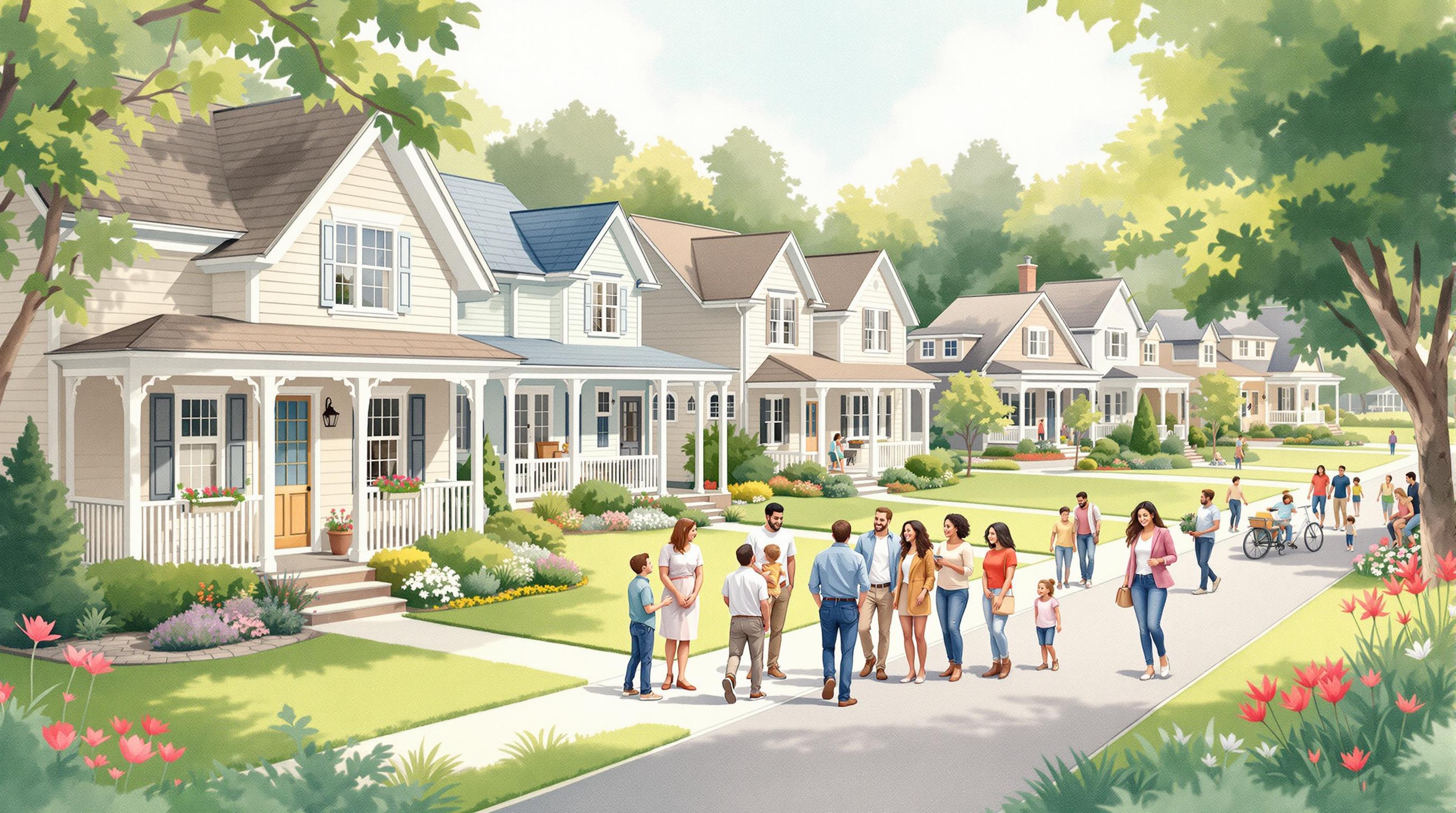Buying your first home in Central Pennsylvania? Here's a quick guide to help you navigate the process and make informed decisions:
-
Step 1: Evaluate Your Finances
Understand your budget, improve your credit score, and explore Pennsylvania's homebuyer programs like Keystone Home Loan and K-FIT for assistance. -
Step 2: Obtain Mortgage Pre-Approval
Get pre-approved to know your price range and strengthen your offers. Choose from loan options like FHA, VA, or USDA, and work with local lenders. -
Step 3: Select the Right Neighborhood
Research areas like Lancaster, Harrisburg, or York based on home prices, schools, and lifestyle preferences. Consider growth trends and commute times. -
Step 4: Partner with a Real Estate Agent
Work with a local agent to find homes that match your needs, navigate regulations, and negotiate deals effectively. -
Step 5: Make an Offer and Finalize the Purchase
Craft competitive offers, complete inspections, and prepare for closing costs to secure your dream home.
Quick Tip: Use Pennsylvania Housing Finance Agency (PHFA) programs for financial support and education to simplify the process.
Ready to dive deeper? Let’s break down each step for success.
What is a PHFA loan? Learn about PHFA and how to qualify
Step 1: Evaluate Your Finances
Before diving into Central Pennsylvania's housing market, it's important to get a clear understanding of your financial situation. With median home prices hovering around $285,000 in 2024, knowing your budget and resources is key to making informed decisions.
Plan Your Budget and Strengthen Your Credit
Start by aligning your budget with the region's typical home prices. Here's a breakdown of potential costs:
- Down Payment: Typically 3.5% to 20% (for a $250,000 home, that's $8,750 to $50,000)
- Monthly Costs: Around $2,121 (includes mortgage, taxes, and insurance)
- Upfront Costs: Factor in 2% to 5% for closing fees and set aside an emergency fund
A strong credit score can help you secure better mortgage rates, especially in competitive areas like Mechanicsburg or Carlisle. Lenders in the region often look for scores above 660. To improve your credit:
- Regularly check your credit report for errors
- Keep credit card balances below 30% of your limit
- Set up automatic payments to avoid late fees
- Hold off on applying for new credit
Take Advantage of Pennsylvania Homebuyer Programs
If you're a first-time homebuyer, Pennsylvania offers several programs to help make homeownership more accessible. A standout option is the PHFA's Keystone Home Loan, which has income limits that vary by county (e.g., $121,800 for 1-2 person households in Dauphin County).
Here are some popular assistance programs:
| Program | Benefit | Requirements |
|---|---|---|
| Keystone Advantage | Up to $6,000 for down payment | Must qualify for Keystone Home Loan |
| K-FIT | Up to 5% of purchase price | Forgiven over 10 years |
| Mortgage Credit Certificate | Up to $2,000 annual tax credit | Income and price limits apply |
Most programs require a few things, such as:
- A $1,000 personal contribution
- Completion of a homebuyer education course
- Meeting minimum credit score requirements (varies by program)
For instance, a Harrisburg buyer in 2024 utilized the Keystone Home Loan program with a 3.5% down payment and received $6,000 in assistance through the Keystone Advantage program.
These resources can help you build a solid financial foundation as you prepare for the next steps in the homebuying process, which we'll cover in Step 2.
Step 2: Obtain Mortgage Pre-Approval
Getting pre-approved for a mortgage can make your home-buying journey smoother. It not only strengthens your offers but also helps you understand what you can afford. In Central PA, lenders usually take 1-3 days to process pre-approval requests.
Types of Mortgages in Pennsylvania
Choose a mortgage that works well with the assistance programs mentioned in Step 1. Many local lenders in Pennsylvania can combine PHFA options with other loan types.
| Loan Type | Down Payment | Credit Score Minimum | Key Benefits |
|---|---|---|---|
| Conventional | 3-20% | 620+ | Lower monthly insurance costs |
| FHA | 3.5% | 580+ | Easier qualification standards |
| VA | 0% | 620+ | No down payment required |
| USDA | 0% | 640+ | Designed for rural properties |
| PHFA | 3-5% | 660+ | Includes down payment assistance |
Tip: Compare these options with the PHFA programs covered earlier.
Documents You’ll Need for Pre-Approval
To streamline the pre-approval process, make sure you have these documents ready:
- 2-3 years of W-2s and recent pay stubs
- Two years of tax returns
- 2-3 months of bank statements
- Summaries of investment or retirement accounts
- Your Pennsylvania ID and Social Security number
"Getting pre-approved for a mortgage is like having a golden ticket in the home buying process. It shows sellers you're serious and gives you a clear picture of what you can afford." – John Smith, Senior Loan Officer at Keystone Mortgage, Lancaster PA
Finding Local Lenders and Brokers in Central PA
Work with lenders who understand the specific needs of Central PA, such as areas prone to flooding near the Susquehanna River. Local expertise can make a big difference.
- Members 1st Federal Credit Union: Offers 24-hour pre-approvals, ideal for buyers in Cumberland County.
- Harrisburg-focused lenders: Specialize in urban property financing.
When choosing a lender, look for competitive rates and strong knowledge of the local market. For context, 30-year fixed mortgage rates in Pennsylvania typically range from 5.75% to 6.25%. Even a small difference - like 0.25% - could save you $37 a month on a $250,000 loan.
Step 3: Select the Right Neighborhood
Choosing the right neighborhood in Central Pennsylvania plays a big role in both your day-to-day lifestyle and the long-term value of your property. It also ties directly to your mortgage options from Step 2 and helps your agent (Step 4) focus on the best properties for you. Here's what to keep in mind when making this decision.
Popular Areas in Central PA
Central Pennsylvania offers a wide variety of communities, each with its own vibe and price range. Below is a snapshot of some of the most appealing areas:
| City/Town | Median Home Price | Highlights | Ideal For |
|---|---|---|---|
| Lancaster | $275,000 | Artsy downtown, farmers markets | Young professionals, culture lovers |
| Harrisburg | $195,000 | Government jobs, riverfront living | Urban lifestyle, career-focused buyers |
| York | $189,000 | Revitalized urban areas, great food | First-time buyers seeking affordability |
| Mechanicsburg | $289,000 | Great schools, suburban atmosphere | Families, commuters |
| Carlisle | $249,000 | Historic charm, college town vibe | Educators, history enthusiasts |
Key Factors to Consider
When evaluating neighborhoods, it's important to focus on aspects that will impact your daily life and future resale value.
Schools and Safety
Even if you don't have kids, the quality of local schools can influence property values. Top districts in the area include:
Commute and Transportation
Think about how easy it will be to get to work or other daily destinations. For example, New Cumberland offers quick, 15-minute access to Harrisburg.
Understanding Market Trends and Home Values
Pair your neighborhood research with your pre-approval budget from Step 2 to narrow down your options.
Population Growth
Lancaster County, for instance, saw a 6.5% population increase between 2010 and 2020, which points to rising demand and potential for appreciation.
Home Values
Stay updated by reviewing county records and real estate reports every quarter.
Investment Opportunities
Certain areas are showing strong growth and development, such as:
- Midtown Harrisburg: Emerging businesses and cultural attractions.
- Downtown York: A growing arts scene and revitalized urban spaces.
- Dillsburg: Rural charm paired with new housing developments.
These factors can help you zero in on a neighborhood that aligns with your goals and budget.
sbb-itb-7fa5722
Step 4: Partner with a Real Estate Agent
Teaming up with a local real estate agent is key to navigating Central Pennsylvania's housing market. They’ll help you balance your neighborhood preferences with your budget and pre-approval limits.
Why a Local Real Estate Agent Matters
A local agent can make all the difference in understanding the nuances of Central Pennsylvania's real estate market. As Sarah Johnson, President of the Greater Harrisburg Association of REALTORS®, explains:
"A good local agent is worth their weight in gold, especially in a complex market like Central Pennsylvania. They can provide insights on everything from school districts to future development plans that can impact your investment."
Local agents bring expertise in several key areas:
| Area of Expertise | Why It’s Important |
|---|---|
| Market Conditions | Helps you understand pricing trends and competition in specific neighborhoods |
| Local Regulations | Ensures compliance with zoning laws, property taxes, and municipal rules |
| Property Issues | Awareness of common challenges, like humidity problems in older Harrisburg homes |
| Community Insights | Provides updates on neighborhood developments and future projects |
Tips for Choosing the Right Agent
Finding the right agent means focusing on their local knowledge and experience. Here’s what to consider:
What to Look For:
- A valid Pennsylvania real estate license
- Certifications such as Accredited Buyer's Representative (ABR)
- 2-3 years of experience, especially with first-time buyers
Questions to Ask During Interviews:
Meet with at least three agents and ask about:
- Experience in your target neighborhoods
- Familiarity with first-time homebuyer programs
- Communication style and availability
- Success stories with buyers like you
- References from previous clients
What Your Real Estate Agent Will Do for You
Finding and Viewing Homes
Your agent will create tailored property searches, offer virtual screening options, and provide detailed value comparisons to help you choose wisely.
Handling Negotiations and Transactions
They’ll guide you through everything from crafting competitive offers to coordinating with inspectors and lenders. Plus, they’ll manage paperwork, deadlines, and even attend the closing to ensure a smooth process.
Navigating the Local Market
Local agents can address specific concerns like flood zones, historic district regulations for PHFA-eligible properties, and how local employers affect property values. They’ll also explain property tax differences across municipalities, giving you a clearer picture of long-term costs.
Step 5: Make an Offer and Finalize the Purchase
"In today's competitive Central Pennsylvania market, buyers need to come in with their strongest offer right from the start. This often means offering at or above asking price and limiting contingencies where possible."
This step ties together your financial groundwork (Step 1) and the local market insights you gained earlier (Step 3) to help you secure the property you want.
Crafting a Strong Offer in Central PA
To stand out, your offer should include key elements that show you're serious and prepared:
| Component | Why It Matters |
|---|---|
| Earnest Money (1-3%) | Shows your commitment to the purchase |
| Down Payment (3.5-20%) | Larger amounts make your offer more appealing |
| Contingencies (2-3) | Protects you while keeping the offer competitive |
| Response Time (24-72 hours) | Gives the seller flexibility to decide |
Inspections and Appraisals: What to Know
Based on your neighborhood research from Step 3, focus on specific inspection areas that are common in Central Pennsylvania homes:
Key Inspection Areas:
- Radon testing (especially in Cumberland County)
- Foundation stability
- Electrical systems (important for older homes)
- HVAC performance
- Signs of water damage or moisture problems
Appraisals should align with your mortgage pre-approval (Step 2). For unique properties, like historic homes in Gettysburg, appraisals may cost around $700 and take longer to complete.
Navigating the Closing Process in Pennsylvania
Your agent (from Step 4) will guide you through the final steps, ensuring everything meets Pennsylvania’s requirements.
Here’s what to expect during the closing process:
- Title Search: Takes about 1-2 weeks to confirm clear ownership.
- Final Documents: Gather essentials like ID, proof of insurance, and funds for closing.
- Closing Costs: Prepare 3-5% of the purchase price.
Tip: If you're a first-time buyer, check if you qualify for assistance programs through PHFA.
From the time your offer is accepted, it usually takes 30-45 days to close on a home in Central Pennsylvania. A final walk-through happens 1-2 days before closing, and the closing appointment itself typically lasts 1-2 hours.
Conclusion: Achieving Homeownership
A Recap of the 5 Steps
Buying a home in Central Pennsylvania involves combining PHFA resources (Step 1) with insights about neighborhoods (Step 3). It all starts with building a strong financial base through budgeting and improving your credit. Getting pre-approved for a mortgage shows sellers you're serious. Choosing the right neighborhood - whether it's Lancaster, Mechanicsburg, or York - ensures you'll love where you live for years to come. A local real estate agent adds expertise to guide you through the market. Finally, making a solid offer and handling the closing process turns your homeownership dream into reality. This step-by-step approach aligns with Central PA's market trends, where preparation and local knowledge pave the way to success.
Advice for First-Time Buyers
For those buying a home for the first time, focusing on PHFA education requirements (Step 1) and staying open to up-and-coming neighborhoods like Midtown Harrisburg (Step 3) can make a big difference. Here are some practical tips:
- Take advantage of PHFA programs and complete the required education early.
- Look into growth areas like Midtown Harrisburg for potential value.
- Build a team of local professionals to help with tricky decisions.
- Research county-specific programs that offer financial assistance.
Understanding the unique aspects of Central PA's housing market will help you make smarter choices.
Helpful Resources
PHFA programs and local groups like Tabor Community Services provide tools like education and down payment assistance. County-specific programs, such as those offered by York's Planning Commission, also address local needs. These resources help strengthen the financial groundwork laid in Steps 1 and 2 and support neighborhood decisions from Step 3.
For tailored advice, reach out to approved counseling agencies like Tabor Community Services in Lancaster or the Community Action Commission in Harrisburg. These organizations offer guidance that aligns with Central PA's housing market, helping you navigate the process with confidence.
FAQs
What is the first-time home buyers grant in PA?
The Pennsylvania Housing Finance Agency (PHFA) provides a $10,000 grant (or 6% of the purchase price) as a 0% interest loan. This loan is forgiven after five years of living in the home. To qualify, you’ll need a credit score of at least 660, complete homebuyer education, and meet local income requirements (check Step 1 for examples). This grant works alongside the budgeting tips and PHFA programs outlined in Step 1.
"Our first-time homebuyer programs are designed to make homeownership more accessible and affordable for Pennsylvania residents." - Robin Wiessmann, Executive Director and CEO of the Pennsylvania Housing Finance Agency
PHFA programs are focused on helping Pennsylvania residents achieve homeownership while also bolstering the state’s housing market. As mentioned in Step 2, working with a PHFA-approved lender can help simplify the approval process.
Related Resources
For more information on PHFA assistance programs and local homebuyer tools, refer to Step 1.



